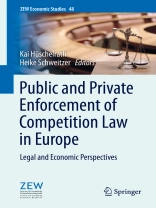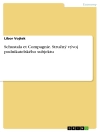Over the past fifteen years, the optimal enforcement of EU competition law has become a major concern. This book contains a unique collection of articles by lawyers and economists on current issues in the public and private enforcement of competition law. Public enforcement has been strengthened in numerous ways – for example, through the introduction of a leniency programme and a substantial increase in fines for competition law violations. At the same time the EU Commission has been promoting private enforcement – for example, by developing a legal framework that grants victims of EU antitrust law infringements access to compensation.
The contributions in this book address a range of topics in the area of competition law enforcement, including the role of fines and leniency programmes in public enforcement; access to evidence and the quantification of damages in private enforcement; and the interaction between public and private enforcement of competition law in Europe.
Cuprins
Public and Private Enforcement of Competition Law in Europe – Introduction and Overview.- Public Enforcement of Anti-Cartel Laws – Theory and Empirical Evidence.- Leniency Programmes and the Structure of Cartels – Remarks from an Economic Perspective.- The Role of Fines in the Public Enforcement of Competition Law.- The Interaction of Public and Private Antitrust Enforcement – The Calculation of Fines and Damages.- The Interaction of Public and Private Enforcement – The Calculation and Reconciliation of Fines and Damages in Europe and Germany.- Disgorgement and Private Enforcement as Mitigating Circumstances for the Determination of Fines in Antitrust Law.- Quantifying Antitrust Damages – Economics and the Law.- Best Practices for Expert Economic Opinions – Key Element of Forensic Economics in Competition Law.- Access to Evidence and Presumptions – Communicating Vessels in Procedural Law.- Economic Evidence in Competition Litigation in Germany.- Private Damage Claims – Recent Developments in the Passing-on Defence.- Competition Law Enforcement in England and Wales.
Despre autor
Heike Schweitzer holds the chair for private law, European economic law and competition law at the University of Mannheim and is director of the Leibniz Science Campus ‘Mannheim Centre for Competition and Innovation’ (Ma CCI). Before joining the Mannheim law faculty, she held the chair for competition law at the European University Institute (Florence, Italy). Her research focus lies in the area of competition law, including competition and regulation of liberalised industries, state aid law and public procurement law.
Kai Hüschelrath is head of the Research Group ‘Competition and Regulation’ at the Centre for European Economic Research (ZEW) in Mannheim and coordinator of the Leibniz Science Campus ‘Mannheim Centre for Competition and Innovation’ (Ma CCI). Since April 2009 he is Assistant Professor of Industrial Organization and Competitive Strategy at the WHU Otto Beisheim School of Management in Vallendar.












